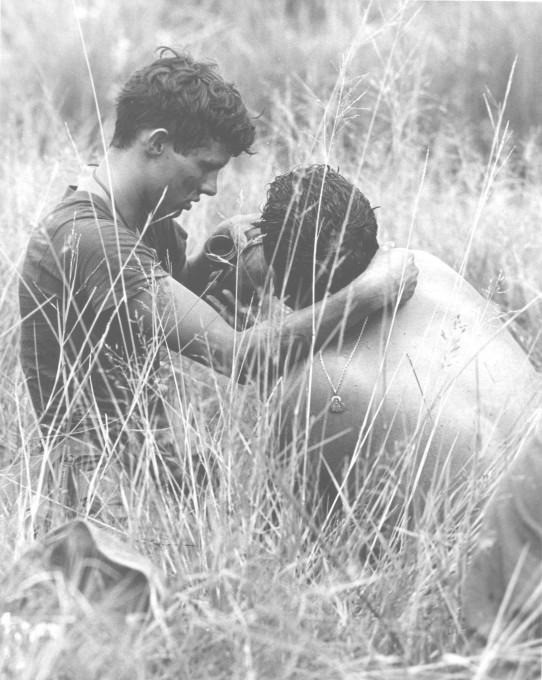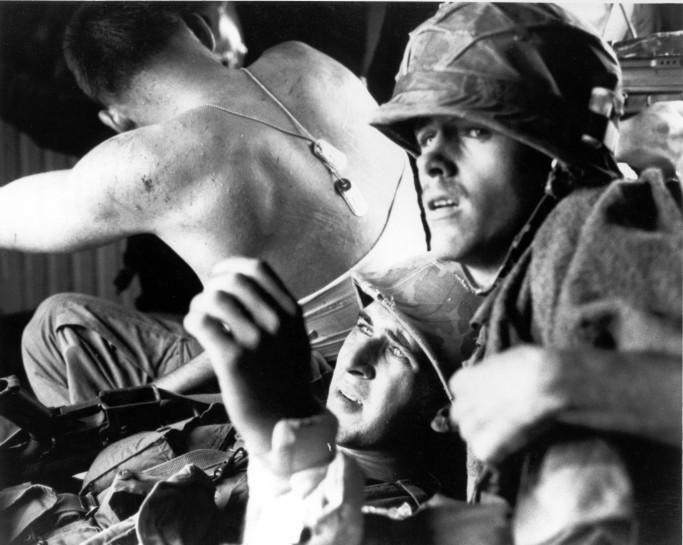"The Best Thing I Ever Did": Evaluating Positive Aspects of the Navy Corpsman Experience from the Vietnam War
Digital Exhibit by Student Curator and DVP Interviewer Dom Repucci, Dartmouth Class of 2020
Jerome Greer Chandler reports that around 10,000 Navy Combat Corpsmen served alongside Marines in the bush during the Vietnam War, occupying one of the most difficult combat roles of the time. In a world full of "sniper attacks, far ambushes, near ambushes, little fire fights, big fire fights, rocketing, mortaring, booby traps, night actions, near capture, [and] near annihilation," rather than just trying to kill the enemy, Corpsmen tried to save the lives of those around them. While most soldiers in combat witnessed some traumatic event, given the nature of their job, one might expect Corpsmen to recall just the bad things. In Christina Weber’s book Social Memory and War Narratives, which explores the influence of trauma amongst Vietnam veterans on their children, she comments on how the typical Vietnam veteran narrative revolves around stories not “just of the war, but of loss of belief in American and the world [t]he[y] knew before entering into war.” Weber's reference of a loss of belief in America is a process catalyzed by experiencing these traumatic events.
The idea of a narrative and the inherent subjectivity of it are two factors important to this exhibit. When speaking about their lives in relation to Vietnam, veterans recount specific experiences; things that they deem important. What is in included in their stories forms a narrative, a story distinct to these veterans. While oral history interviews of Vietnam veterans include details about atrocities, wounds, the loss of friends, difficulty returning home, and countless other hardships, the Corpsman narrative is not just composed of chaos. This is not to say that all Corpsmen narratives are identical and unilaterally positive.
This digital exhibit includes four content pages: “Corpsman Up,” “Yeah, Well They Saved my Life Everyday," “There Were Times That We Laughed,” “They Still Loved Their Doc,” and a fifth page including audio and text from a recent interview with Corpsman Jack Cassidy of Kilo Company, 3rd Battalion 1st Marines. Examining Cassidy’s story along with that of three other contemporary Navy Corpsmen, Bob Cahill of Delta Company, 1st Battalion 26th Marines, Robert Devereux-Slingluff of Lima Company, 3rd Battalion 1st Marines, and Robert Ordonez of Company H, 3rd Battalion 1st Marines demonstrates the specificity of the Corpsman narrative.
In oral history interviews, Corpsmen narrate their own Vietnam experience, including times of hardship, but also emphasizing the importance of a brotherhood amongst fellow Marines and the notion that in a state of chaos, they were the ones that could make a difference. In an unpredictable war with unpredictable enemies, the Corpsman narrative reminds us that what was certain was their focus on their job, commitment to their men, the fact that some of these men used fun to escape from the harsh realities of combat, and just how thankful they were to be part of such a special group in years after.
There is no order in which to view these pages, though the “They Still Loved Their Doc” reunion page is best served if viewed last. “Corpsman Up” focuses on the positive impacts of doing the job. “There Were Times That We Laughed” focuses on avenues of mental escape of Corpsmen from their difficult job, and “Yeah, Well They Saved my Life Everyday” includes stories about developing a permanent brotherhood. Clicking the titles of pages in the previous few sentences will take you to the corresponding page! In no way is this exhibit supposed to represent the entirety of the Corpsman experience from Vietnam, rather it is supposed to emphasize some positive aspects of the job and remarkable characteristics of the young men who did it.
Enjoy this exhibit about these amazing men!

